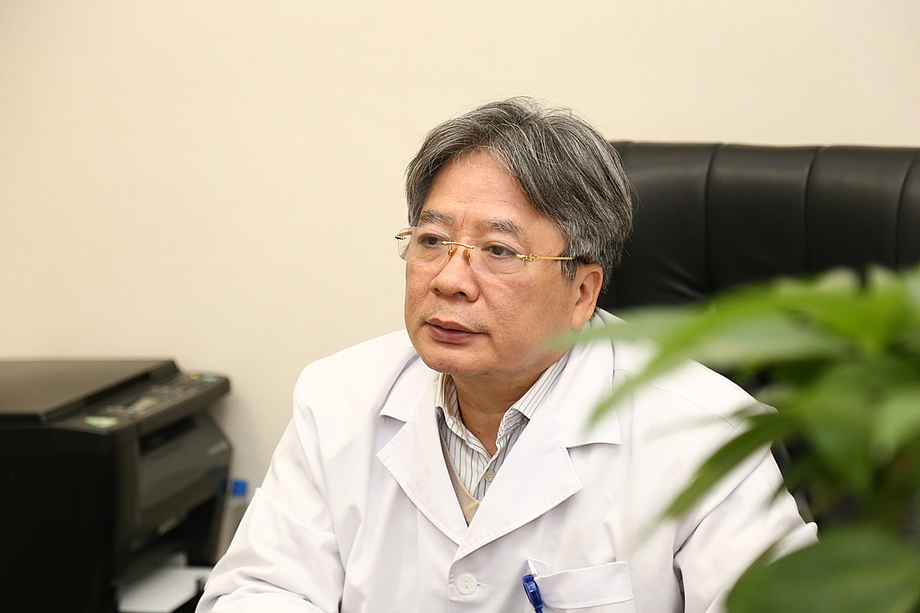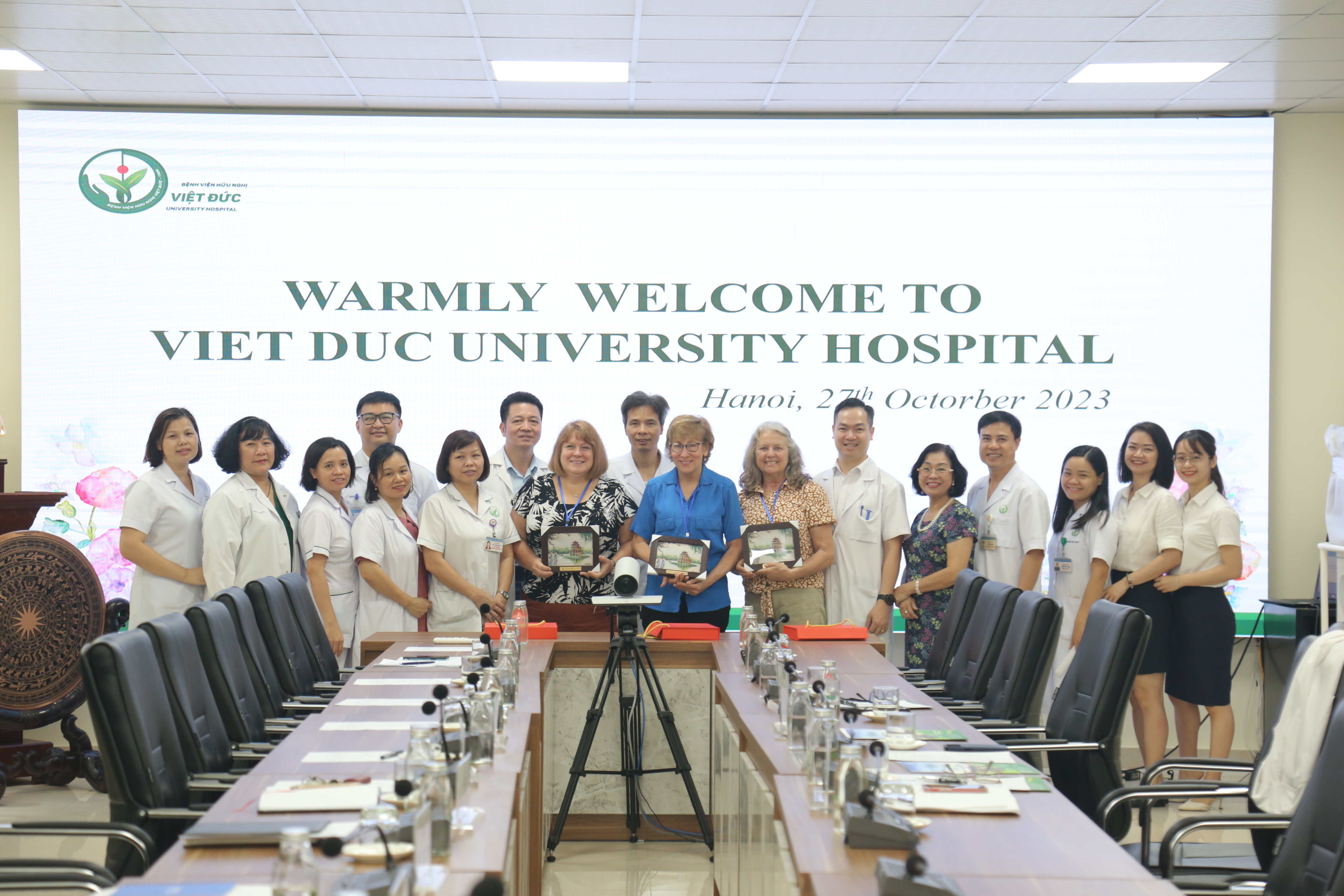A laparoscopic surgical “machine” bought with money to buy a car
12/03/2021 13:22
In the 1990s, the cost of a laparoscopic surgery “ machine – system” was about 700 million VND, a very large amount at that time. Dr. Tran Binh Giang, who just learned laparoscopic from France, wanted to bring this to Vietnam, but the first question was “where is the money?”.
Doctor Giang that year, now Prof. Tran Binh Giang, 59 years old, Director of Viet Duc University Hospital, Hanoi. He is the pioneer in bringing laparoscopic surgery to Vietnam. He said that without the Director of hospital at that time – Prof. Nguyen Duong Quang, to spend money granted by the Government to buy a car to purchase laparoscopic system, the laparoscopic surgical field in Vietnam was still slow to progress.
Back then, after studying laparoscopic from France, young doctor Tran Binh Giang wanted to bring the most modern technology in the world to Vietnam, but hospital did not have the equipment. The doctor sadly confided to Prof. Vu Manh who was Deputy Head of Medical Administration Department of Viet Duc University Hospital. The cost of buying a laparoscopic system is extremely expensive, about 700 million VND. “Where is the money to buy?” both teacher and student wondered.
Prof. Nguyen Duong Quang has a “money bureau” of 500 million VND granted by the Government to buy a car and replace a car used by Prof. Ton That Tung, already too old. Listening to Prof. Vu Manh and Dr. Giang’s mentioned that they did not have money to buy the equipment, Prof. Quang said: “What do I need a car for. You keep that money, the hospital compensates more to buy that system”.
So the first laparoscopic system in Vietnam was bought from the amount granted to buy a car plus more than 100 million VND from hospital.
“Prof. Quang and Prof. Manh are two people that I have always been grateful for and always remember on February 27 – Vietnam Physician Day”, Prof. Giang shared.
Having a laparoscopic set, but the big difficulty that Dr. Giang encountered was lacking of trust from the majority of experts and patients. Many people believe that open surgery is difficult, laparoscopic surgery with limited vision, even more difficult. When Prof. Ton That Bach assigned Dr. Giang to perform laparoscopic surgery for his own father-in-law and uncle, the young doctor became more confident with this technique.
“Teacher Bach is also a person who influences me a lot. I learned from him everything, from expertise to life” said Mr. Giang.
The shift from open surgery to laparoscopic surgery has become one of the turning points of Vietnamese medicine. Prof. Giang is one of the first to contribute to the turning point. 5 years after the first laparoscopic surgery in the world, Viet Duc University Hospital has implemented this technique.
Up to now, Dr. Giang has taught laparoscopic techniques to most other units across the country, 2,000 doctors have studied and performed laparoscopic surgery.
“More than 90% of hospitals from lower level upwards have had laparoscopic surgery. Overseas doctors also come to learn Vietnamese technology. It was a huge success” said Prof. Giang.
In addition to laparoscopic, the preservation of injured organs is also one of the turning points of Prof. Giang’s career. Previously, when injured, rupture of liver, spleen, kidney, and pancreas … had to be removed. During surgery, patient is in pain, accompanied by postoperative treatment, infusion, a lot of medicine, and the risk of infection.
While doing his PhD thesis, Mr. Giang did research on spleen conservation. Spleen is an organ with only blood. Previously, when the spleen was slightly ruptured it will be removed, but according to studies around the world, there will be disorders of the body when splenectomy.
“At that time I raised the issue of holding back. When voicing the idea, the teachers did not support the concept of fragmentation that must be cut. But I had the first successful splenectomy in 2000, opening a new direction. On that basis, I continued to study to conserve other ruptured organs such as liver, kidney …” Prof. Giang said.
Currently, 95% of cases of liver rupture, kidney or spleen rupture, no need for surgery but only need preservative treatment. These techniques have also been transferred to many hospitals across the country.
30 years and after
More than 30 years ago, Mr. Giang was a young graduate student from Thai Binh, who just graduated, entered the gate of Viet Duc University Hospital as a resident doctor, now he is a director. He said that the achievement was thanks to the teachers and mentors.
“I come from the countryside to study in the city. I am not a ‘ child of family with line of succession in medicine “, worked on my own, very hard. I am fortunate to be taught by the teachers in terms of both skills and morality, and how to deal with patients” said Mr. Giang.
In 1984, when he entered the hospital at Viet Duc University Hospital, Mr. Giang was one of two people who had the right to choose a specialty because he had the highest exam scores. Seeing the behavior of surgical “seniors” quickly and decisively, he chose. When he entered medical school, he weighed 52 kg. After 5 years in medical school, he has 47 kg left. “My teacher in charge even asked” How can a person like you to be a resident doctor ”.
The process of learning to be a surgeon is a long one. At first, he was allowed to watch only while teachers were operating, then he was allowed to perform operations such as holding forceps, sticking cotton in a blood spot. After a while, stitches the skins are allowed.
“At that time, being given an appendectomy, I felt very honored” said Mr. Giang.

Prof. Tran Binh Giang, Director of Viet Duc University Hospital. Picture: Kim Oanh.
Thinking about the day of Vietnamese Physician, Mr. Giang did not forget the nurses who supported him and his friends since he was in resident time.
“In the old days, I was hungry when I just finished eating. During the resident session, nurses cooked more rice for us to eat. After eating, we were given half of bread to save, but we were so hungry, we often ate it right away” said Mr. Giang.
When he became Head of a special-class hospital, a leading surgery in the country, where there is a long history, Mr. Giang was under a lot of pressure. In the current trend, hospitals are assigned autonomy. In addition to professional duties, it is worried that hospital will operate effectively, take care of patients well, and ensure the lives of 2,300 employees so that they can confidently dedicate.
“I am a doctor, not trained in economics, but have to run a large hospital, take responsibility for history, staff life, and patients. That is a lot of pressure on me and the hospital leadership team”, he said.
With great contributions to the development of country’s medicine, Prof. Tran Binh Giang was awarded the title of Excellent Physician in 2005, People’s Physician in 2012, and received Second-Class Labor Medal in 2015, awarded the title National Emulation Soldier 2016.
In 2019, he was awarded with Vietnam Glory Award and the First Prize of Vietnam Talent Award for his scientific research “Research and application of laparoscopic surgical advances to treat some abdominal diseases”. In 2020, Prof. Tran Binh Giang was awarded the title Labor Hero by State President
Talking about arrangements, Mr. Giang said he has reached the end of his career. He cherished transmission and fostering for the next generation to develop. “The new generations are excellent. I believe they will able to do it” Professor expressed.











